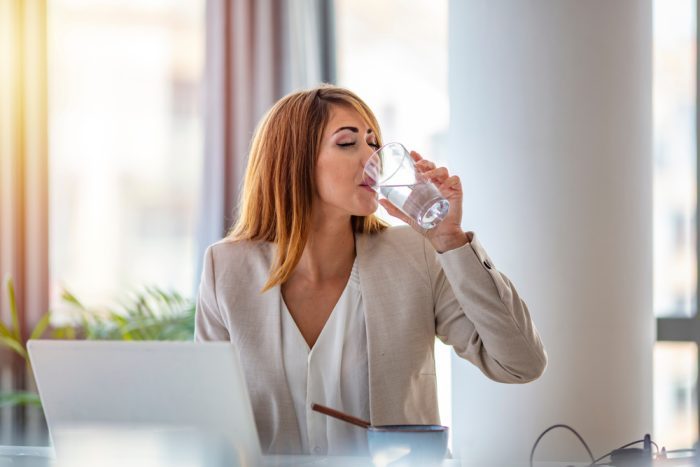
Everyone’s taken a sip of water at least once in their lifetime. However, not everyone knows what happens when you drink water. How the human body processes water is an extremely complex process involving multiple organs—even ones beyond the digestive tract.
Here at Lipsey, we provide office water delivery in Atlanta and as experts on what water can do for you, we are here to let you in on what water does and where it goes every time you drink. So, how does water travel through the body? What does its path look like?
It Begins with Thirst
This may seem quite obvious, but you won’t typically feel inclined to drink water unless you’re thirsty. When you start becoming dehydrated, your body will give you a few distinct signals. Your mouth might feel a bit dry, you might start coughing for no discernable reason, your skin will feel chalky, and you’ll feel oddly sluggish. These are all signs that your body is ready for a sip. However, for some, it’s not so straightforward. Executive dysfunction can cause many people to outright forget to drink water, even when their bodies are giving them all of the signs.
Sometimes they’ll simply forget; other times they won’t even make the connection between the symptoms and the problem. For these people, it may be necessary to set reminders just to get them to drink water. If you need constant nudge to hydrate, a smart app and water-rich food are among some ways to help you remember to drink water.
Entering the Body
The most optimal and commonplace method of entry is through the mouth. After a few gulps, your body should shut off the thirst response, leaving you with that refreshed feeling we all know and love. Here is where the process of water absorption in the body begins. With enough water in your body to start the hydration process, this should be where digestion starts, right?
Digestion vs. Absorption
Wrong. Water, unlike food, doesn’t get “digested”—there’s nothing much to digest anyways. Rather, water is absorbed through the tissues and into the surrounding cells. This process starts in the mouth and esophagus to an extent, keeping both areas moist and lubricated. However, it really kicks off once the water enters your stomach. Here, the body begins absorbing it into your bloodstream, where it will then be circulated throughout your entire body.
How much water gets absorbed from the stomach and how quickly it is absorbed is influenced in part by how much food has been ingested. If someone drinks water on an empty stomach, their water absorption rate is generally faster — sometimes as soon as 5 minutes after taking a sip. If the person eats a bunch of food before drinking water, the rate of absorption will slow down drastically, and absorption may take several hours. This is the same reason why doctors advise you to take some medications after meals—your body may absorb the dosage too quickly, causing potentially adverse effects.
Where the Stream Takes It
Though some water does stick around in the digestive tract to assist in the digestive process—particularly being a crucial element in digesting proteins—much of it is absorbed into the bloodstream. Some of it is absorbed through the stomach, but the majority of it is absorbed through the lining of the small intestine. With a length of around 20 feet, the small intestine is the organ most responsible for water absorption through its walls and into the bloodstream. Once it’s absorbed, the water will then go to cells all over the body, giving them the hydration they need to execute their everyday duties effectively.
So, the water is now in your bloodstream, traveling to different organs. What does it do once it gets to its destination?
Kidneys
If you know anything about your kidneys, it’s that they require a lot of water to function. However, their function seems to elude many people. As it happens, the kidneys’ primary function is to filter toxins from the body and expel them in the form of waste—that being urine. Water plays a key role in this filtration process, and a lack of water can ultimately lead to complications such as kidney disease and kidney stones—hard deposits of unabsorbed minerals that cause intense pain when passed through the urinary tract.
One of the ways the kidneys try to adapt to a lack of water is by concentrating the urine, giving it a higher waste-to-water ratio. This makes it more yellow in color and is exactly why checking the color of your urine is a tried and true way to determine your approximate level of hydration. Be mindful though: different lighting can make these colors look different, thus making this a somewhat inaccurate method under certain circumstances.
Other Functions
Though the kidneys are where water truly shines, it has other, lesser-known functions in the body as well. For instance: did you know some of the water travels directly to your brain? Not to be confused with hydrocephalus—a deadly condition where too much fluid gathers in the brain—water plays a key role in cognitive function. To run smoothly, brain cells require a careful balance of water and electrolytes; otherwise, their efficiency may suffer. You may lose your capacity to concentrate for extended periods of time if your brain is not functioning at its best due to dehydration. It could also impair your memory and cause mood swings. Drinking water is thus important in order to increase your brain’s performance.
And the list goes on: your skin’s natural glow and bounce, the lubricating fluid between your joints, the concentration of acid in your gut, the amount of sweat you produce, and even the consistency of your mucus can all boil down to how well-hydrated you are. Eventually, it will be excreted through waste or otherwise evaporated off of the skin, and you’ll need to replenish it. As electrolytes are also crucial in hydration, consider our office water delivery in Atlanta to help keep you and your coworkers at their peak. At Lipsey, our water is sourced directly from mountain springs, meaning it comes packed with minerals to give you the best possible hydration. From water dispensers to bottled water, we’ll make sure everyone is happily hydrated.
